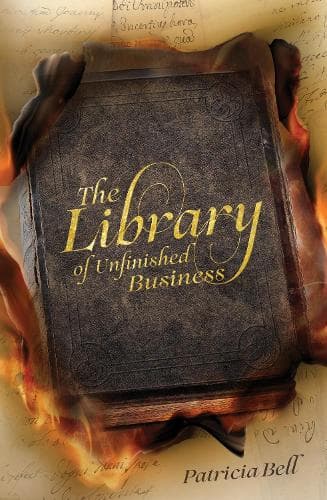Review: The Library of Unfinished Business
Reviewed by David Hill
The publishers obviously want us to take notice of Patricia Bell; their media release for this first novel prints her biography twice, with a quick addendum in Version 2.
Which sends me off into a grumble to the same publishers (who have made a bright, neat job of producing this book) and to others. I reckon a lot of readers mostly want to know about an author as .... well, an author. Do we need to hear that she's “...a bird nerd...a proudly loud feminist and born-again agnostic”?
Maybe. Maybe the author as celebrity and de facto “friend” are now welded to them as writer. But Twitter and clutter are the words that come to my mind. What was wrong with “X is a fulltime author living in Y. This is their first novel”? Harrumph, I say.
The plot, the plot. Maurice is incomplete, ineffectual, unregarded. He's also dead, in a car crash. Daughter Andy is bereft and bewildered. Look at all the lonely people. A great opening sentence: “On the day I died, I was running happily late for work”. (The impact is in that adverb.) As a result, librarian Maurice shifts to Hippy Happy Heaven, where some angels carry clipboards, there are nametags and cocktails on the lawn with God every Tuesday at 5pm and St Peter sports a man-bun.
Here, our anti-hero meets his daughter's late-in-all-senses boyfriend, Kit, nicotine-addicted, bumbling, essentially decent, who becomes his unofficial guide. There's also Jezebel and Eve, with their emphatically unspiritual hormones; Moses, who keeps trying to part various waters; John the Baptist, who won't stop dunking people; many, many others.
It's clever, nicely subversive. It's part of the novel's appeal, as the celestial kingdom darkens from a sort of Butlin's holiday park to a quasi-fascist regime. It's also very insistent. The individually witty (cabin inspections; locations called the Hallelujah Hall and God's Glory Glade) bits start to resemble the friend we all know who makes funny puns....and won't stop making them. You begin to wish for more matter and less art. Less artifice, anyway, and maybe less matter also in some of the Heaven scenes. The book's sins are ones of inclusion rather than omission.
Meanwhile, the letters which desolate Andy writes to her father and herself are direct, anguished, affecting. Hers is the voice that grabs you. A wannabe writer, she's loving and resentful, vulnerable and gutsy. Bell evokes her authentically and affectingly.
If the novel's middle sections sometimes wobble, the later chapters pick up speed and purpose as Maurice joins an unlikely but satisfying revolution in Heaven. There's managerial change and décor change; increased personal satisfaction. Samson starts teaching aqua aerobics. The clever stuff is still there but plot takes precedence and characters evolve. When a second road accident seems likely to thrust Andy into the same celestial dystopia as her dad, Maurice takes some of the most assertive steps of his life – pre or post-death. He confronts, endures, finds he can and should forgive, even manages to preserve a few library books. Good narrative moves.
“Genre-bending,” claims the media release. Genre-hopping, rather, and with nifty moments as well as those more insistent ones. Oscar Wilde would probably have approved of Bell's riff on his dictum. Suspend disbelief for much of the story and you'll find an author whose name you'll want to remember.
Reviewed by David Hill
